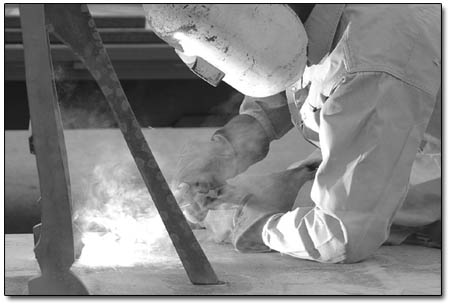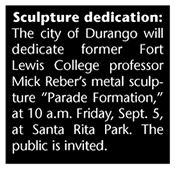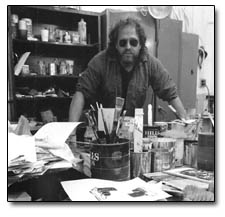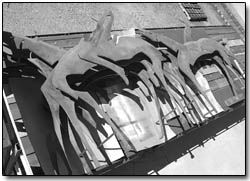|
Sculpture gets new home in Santa
Rita Park
written by Missy Votel
 |
| Kenneth Seay, a welder
with Holt Sheet Metal, secures the leg of “Parade
Formation,” a steel sculpture by former FLC
art professor Mick Reber, to its concrete base in
Santa Rita Park on Wednesday morning./Photo by Todd
Newcomer |
Almost two years after the city of Durango
installed three public sculptures along East Second Avenue,
it is preparing to unveil yet another public piece of
art, as well as an effort to facilitate more in the future.
“Parade Formation,” a 30-by-10-foot steel
sculpture by former Fort Lewis College art professor Mick
Reber, was erected in Santa Rita Park on Wednesday morning,
the latest in a series of public art works donated to
the city over the last few years. The donation marks the
culmination of a long-term plan by Reber, whose career
at the college spanned 30 years, to donate a piece to
the city.
 The
sculpture, which is valued at $50,000, is a two- and three-dimensional
abstract depicting three horse riders meant to blend old
west and contemporary western images, according to Reber. The
sculpture, which is valued at $50,000, is a two- and three-dimensional
abstract depicting three horse riders meant to blend old
west and contemporary western images, according to Reber.
“A couple of years ago I began a series of drawings
dealing with imagery relating to the horse and rider,”
said Reber, who is currently building a studio in the
small town of Bayview, Texas. Reber moved to the town,
which is near South Padre Island, in May of 2002 to be
closer to family.
“As the drawings progressed, the idea of ceremony
began to take over, with horse and rider in a kind of
parade formation,” he said. “My purpose soon
became a search to secure a series of stylized drawings
which would capture the spirit of that feeling in sculptural
form.A0I was far more interested in a spiritual connection
of past and presentA0than a literal one,A0evoking a kind
of symbolic sense of honor to the way horse and rider
have been used in ceremonies throughout the history of
Durango as well as other areas of the world.”
Rosie McGowan, the project’s manager and Reber’s
partner, said originally she had tried to get the sculpture
erected at the newly revamped entrance to the city at
the juncture of Highways 550 and 160 directly southwest
of town. However, the idea was nixed by the Colorado Department
of Transportation because of safety concerns, namely a
lack of parking.
“CDOT decided it wasn’t really a good place
if people wanted to stop and get out of their cars,”
she said. “We were disappointed but it seemed to
make sense because of safety issues.”
 |
| Artist Mick Reber, seen here in
his former studio, donated a 30-by-10-foot steel sculpture,
“Parade Formation” to the city of Durango.
The sculpture was installed Wednesday in Santa Rita
Park./Photo courtesy Mick Reber. |
From there McGowan contacted the city, which helped find
a better site. Linda Lewis, with the Durango City Manager’s
Office, said she was contacted by McGowan and directed
her to the city’s newly established art committee.
The committee was formed in 2001 as a response to three
donated sculptures, “Puck” and “Mudra,”
two dancers cast in bronze by artist Elizabeth McQueen,
which are now along East Second Avenue; and “My
Children,” another bronze by artist Allen Houser
that sits in front of the Durango library. According to
Lewis, the idea for a citywide policy was hatched by former
assistant to the city manager, Clint Kinney.
“It started with the donation of the pieces along
Second Avenue,” she said. “It got him thinking
about a policy.”
Up until that point, the city had no clearly defined
ways of dealing with donated art work, she said.
“It was serendipitous and haphazard when we’d
get these donations,” she said. “We’d
say, ‘That’s great, but where do we put them.’”
In response, the city appointed a four-member art committee,
made up of local artists and members of the local arts
community, to advise the city on site selection and what
type of art to display and where.
“It puts us in more control,” she said.
Lewis pointed MacGowan in the direction of the art committee,
which already had done site research and suggested the
Santa Rita Park location. From there, the project involved
an orchestrated effort that included several entities
and agencies, she said.
After meeting with the art committee, McGowan approached
the Parks and Forestry Board, which oversees management
of the park.
“Rosie went to a meeting and gave a presentation
on the project, and they recommended that City Council
approve it, which they did,” Lewis said.
However, this was only the beginning, Lewis said. From
there, the Durango Parks and Recreation Department got
involved to prepare the site and the Public Works Department
was called upon to design the concrete base. Private entities
pitched in as well, with Holt Sheet Metal donating half
of the raw material for the sculpture’s fabrication,
Four Corners Construction donating concrete for the base
and Firehawk Construction donating labor, McGowan said.
Despite the various parties involved, McGowan said the
project thus far has gone surprisingly smoothly.
“There was no hesitation on the part of the city
and all of the donors have been fantastic,” she
said.
McGowan said that Reber, whose works are in collections
all over the world – including that of Hotel Belagio
owner Steve Winn, has been humbled by the assistance and
cooperation he received.
 |
“Parade Formation,”
by Mick Reber, sits idle on a trailer at Holt Sheet
Metal on
Tuesday prior to being installed at Santa Rita Park./Photo
by Todd Newcomer |
“It’s just really exciting for Mick to have
this go up,” she said, adding that Reber plans to
return to Durango for the dedication on Sept. 5. “This
is a big thing in his career to have a piece this large
in a city like this.”
Lewis said collaborations like this are something the
city would like to see more of in the future. In fact,
this past week, she presented the City Council with options
on promoting public art as well as developing a policy
on the topic.
“City Council is interested in learning what to
do to promote more public art,” she said. “I
think the sense is that people enjoy it, to have art adds
to the aesthetic culture of a town.”
Lewis said so far, it appears that the public is behind
the city on backing public art.
“The Second Avenue sculptures are very well received,”
she said. “In the winter, Puck has always got a
scarf on.”
She said since the East Second Avenue sculptures went
up, interest from artist and donors to display art has
been brisk as well.
“Since then, we continually get donations and artists
approaching us,” she said, adding that the city
has another piece of public art waiting in the wings behind
Reber’s. The work, called “Life Wall,”
is a sculpture by Willa Shalit, daughter of film critic
Gene Shalit, which was bequeathed by an anonymous donor.
Lewis described it as a montage of bronze body parts and
masks depicting influential people of the 20th century.
In fact, Lewis said the biggest obstacle is not public
opinion or the availability of art, but the age-old dilemma
of money.
“I think people are in favor of public art because
it becomes part of the character of the city in a positive
way,” she said, “it’s just trying to
find money for it, as always.”
|

